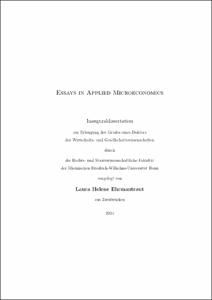Ehrmantraut, Laura Helene: Essays in Applied Microeconomics. - Bonn, 2024. - Dissertation, Rheinische Friedrich-Wilhelms-Universität Bonn.
Online-Ausgabe in bonndoc: https://nbn-resolving.org/urn:nbn:de:hbz:5-75602
Online-Ausgabe in bonndoc: https://nbn-resolving.org/urn:nbn:de:hbz:5-75602
@phdthesis{handle:20.500.11811/11448,
urn: https://nbn-resolving.org/urn:nbn:de:hbz:5-75602,
author = {{Laura Helene Ehrmantraut}},
title = {Essays in Applied Microeconomics},
school = {Rheinische Friedrich-Wilhelms-Universität Bonn},
year = 2024,
month = mar,
note = {This thesis comprises three chapters, each serving as an independent research paper. Collectively, they all revolve around exploring individual decision making, with particular emphasis on the role of expectations and perceptions in the decision making process.
The first chapter explores students' expectations about the returns to completing higher education and provides first evidence on perceived signaling and human capital effects. We elicit counterfactual labor market expectations for the hypothetical scenarios of leaving university with or without a degree certificate among a large and diverse sample of students at different stages of higher education. Our findings indicate substantial expected labor market returns from signaling. Over the expected course of career, we find lasting perceived education premia as well as evidence consistent with perceived employer learning.
The second chapter answers the question: Why do employers seek to attract individuals with more education? We experimentally vary rates of master degree completion on applicant résumés to shift employer beliefs about candidates' productive traits. Our results confirm that a master's degree raises candidate desirability. Moreover, we find that master graduates outperform bachelor degree holders in terms of employer perceived cognitive and non-cognitive traits as well as subject matter expertise. Conversely, master dropouts are associated with weaker non-cognitive traits. Notably, these perceived traits account for up to 75% of candidate attractiveness. This paper thus provides causal evidence on the origins of the education premium.
The third chapter investigates the attitudes towards paternalism in an incentivized laboratory experiment. We test if individuals are willing to give up money in order to remove a paternalistically motivated constraint that restricts their choice set in a decision under risk. We find that individuals are willing to give up money in almost half of their decisions in order to be able to make an unrestricted choice. Disentangling the intrinsic value from the instrumental value of freedom of choice, we observe positive intrinsic values of freedom of choice in about 30% of all decisions. Occurrence and magnitude of the intrinsic value of freedom of choice vary between individuals and across decision contexts, i.e., for different types of risks (gains versus losses, long shots versus 50-50), but merely by stake size.},
url = {https://hdl.handle.net/20.500.11811/11448}
}
urn: https://nbn-resolving.org/urn:nbn:de:hbz:5-75602,
author = {{Laura Helene Ehrmantraut}},
title = {Essays in Applied Microeconomics},
school = {Rheinische Friedrich-Wilhelms-Universität Bonn},
year = 2024,
month = mar,
note = {This thesis comprises three chapters, each serving as an independent research paper. Collectively, they all revolve around exploring individual decision making, with particular emphasis on the role of expectations and perceptions in the decision making process.
The first chapter explores students' expectations about the returns to completing higher education and provides first evidence on perceived signaling and human capital effects. We elicit counterfactual labor market expectations for the hypothetical scenarios of leaving university with or without a degree certificate among a large and diverse sample of students at different stages of higher education. Our findings indicate substantial expected labor market returns from signaling. Over the expected course of career, we find lasting perceived education premia as well as evidence consistent with perceived employer learning.
The second chapter answers the question: Why do employers seek to attract individuals with more education? We experimentally vary rates of master degree completion on applicant résumés to shift employer beliefs about candidates' productive traits. Our results confirm that a master's degree raises candidate desirability. Moreover, we find that master graduates outperform bachelor degree holders in terms of employer perceived cognitive and non-cognitive traits as well as subject matter expertise. Conversely, master dropouts are associated with weaker non-cognitive traits. Notably, these perceived traits account for up to 75% of candidate attractiveness. This paper thus provides causal evidence on the origins of the education premium.
The third chapter investigates the attitudes towards paternalism in an incentivized laboratory experiment. We test if individuals are willing to give up money in order to remove a paternalistically motivated constraint that restricts their choice set in a decision under risk. We find that individuals are willing to give up money in almost half of their decisions in order to be able to make an unrestricted choice. Disentangling the intrinsic value from the instrumental value of freedom of choice, we observe positive intrinsic values of freedom of choice in about 30% of all decisions. Occurrence and magnitude of the intrinsic value of freedom of choice vary between individuals and across decision contexts, i.e., for different types of risks (gains versus losses, long shots versus 50-50), but merely by stake size.},
url = {https://hdl.handle.net/20.500.11811/11448}
}






